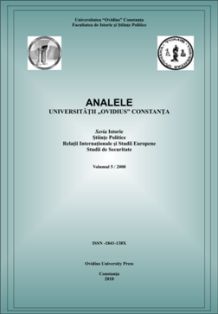Brazilia – o putere regională cu valenţe mondiale. Politica externă braziliană în perioada administraţiei Luiz Inacio Lula da Silva, 2002-2009
BRASIL A REGIONAL POWER WITH WORLD PERSEPECTIVES
Author(s): Iulian NiţuSubject(s): History
Published by: Ovidius University Press
Keywords: reforms; multilateralism; regional power; Mercosur; UNASUR
Summary/Abstract: The international political scene went in the last twenty years through a series of profound political and economic transformation: a new world order based on the mechanism of global markets and the gradual emergence of new global political players are just some of the factors that have contributed to the change course of the world today. Brazil has also gone through major changes illustrated by the increasing influence in the area of South America and its recognition as a premier global player. These changes in Brazil's position in the region and the world have occurred as a result of both the processes of regional and global objectives in areas that affect the South American giant in different ways, and decisions taken by the government of Luiz Inacio Lula da Silva. Structural and systemic changes that marked the early 1990s Brazil, require a brief review. First, there has been a huge effort to open the economy. This plan started during the presidency of Fernando Collor (1990-1992), and because it was a success, was followed by the Real Plano (Real Plan), a macroeconomic stabilization plan launched by the Minister of Economy Fernando Henrique Cardoso during the Itamar Franco administration (1992-1994). Plano Real, was continued and strengthened during the two presidential mandates held by Fernando Henrique Cardoso (1995-1999 and 1999-2002), despite numerous financial crises that hit Brazil, leading to the negotiation of stand-by agreements with the IMF (1998, 2001, 2002). Cardoso administration period witnessed a complex process of legislative and institutional changes which have exerted significant effects on domestic Brazilian macroeconomic realities, but also a set of relevant foreign policy, most of them manifested in regional integration schemes with Mercosur and negotiations in accordance with U.S. proposal to create a free trade area of the Americas (FTAA). The stabilization process allowed a new international projection of Brazil, mainly due Cardoso established good relations with some of the most important world leaders (the G-7). Whatever the relative weight of Brazil in global and regional supply schemes in the early 1990s, it is noteworthy that due to the impressive economic mass, diplomatic projections, it’s capacity to attract foreign direct investment on a regular basis and other factors, Brazil had already a degree of influence in the region.
Journal: Analele Universităţii Ovidius din Constanţa - Seria Istorie
- Issue Year: 2008
- Issue No: 05
- Page Range: 167-180
- Page Count: 14
- Language: Romanian

